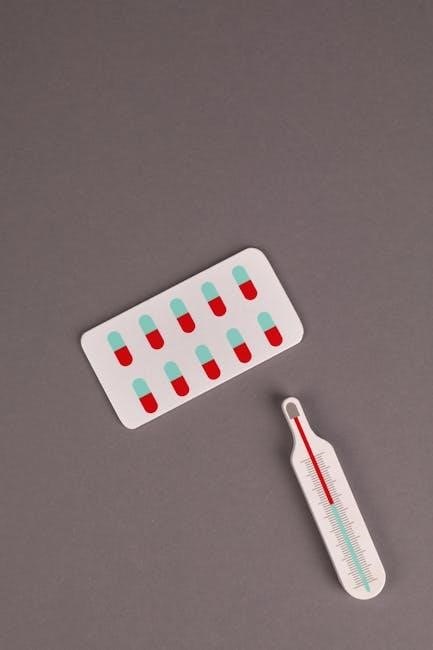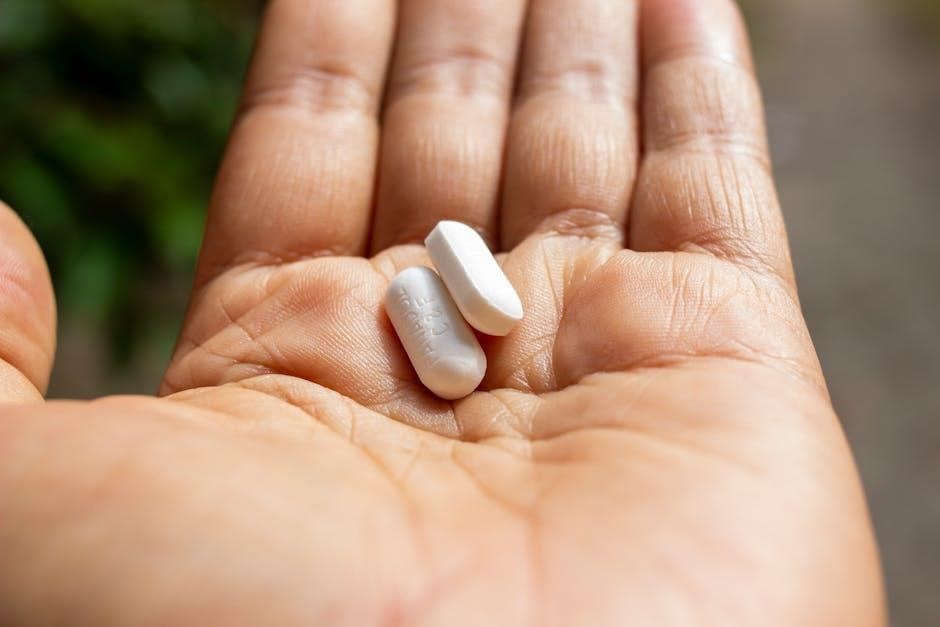An oral ivermectin dosage calculator for dogs is a tool designed to help pet owners and veterinarians determine the correct dose for treatment, ensuring safety and efficacy.
1.1 What Is an Oral Ivermectin Dosage Calculator?
An oral ivermectin dosage calculator for dogs is a tool designed to help determine the precise dose of ivermectin needed for a dog based on its weight and treatment purpose. It simplifies the process of calculating the correct amount of medication, ensuring safety and efficacy. The calculator typically takes into account the dog’s weight in kilograms or pounds and the recommended dosage range for specific conditions, such as heartworm prevention or mange treatment. This resource is invaluable for pet owners and veterinarians to avoid underdosing or overdosing, which can lead to health risks. By providing accurate measurements, it promotes effective and safe treatment outcomes for canine care.
1.2 Importance of Accurate Dosing in Canine Treatment
Accurate dosing is critical when administering ivermectin to dogs to ensure effectiveness and minimize health risks. Incorrect dosing can lead to underdosing, reducing the drug’s efficacy, or overdosing, which may cause toxicity. Ivermectin toxicity can result in severe symptoms, including neurological issues, making precise calculation essential. The dosage must align with the dog’s weight and the purpose of treatment, such as heartworm prevention or mange therapy. Using a dosage calculator helps tailor the dose to individual needs, preventing potential harm and ensuring therapeutic success. Always consult a veterinarian to confirm calculations and avoid adverse reactions, as improper use can endanger your dog’s health.

How to Use the Oral Ivermectin Dosage Calculator
Enter your dog’s weight in pounds or kilograms, select the desired dosage range, and calculate to determine the precise amount of ivermectin needed for safe treatment.


2.1 Step-by-Step Guide to Calculating the Dosage
- Enter the dog’s weight in pounds or kilograms.
- Select the desired dosage range (e.g., 0.0027–0.38 mg).
- Click “Calculate Dosage” to determine the exact amount in mL.
- Use the result to administer the precise ivermectin volume safely.
This method ensures accurate dosing based on weight, minimizing risks of over- or under-treatment. Always double-check calculations and consult a veterinarian for personalized advice.
2.2 Understanding Weight-Based Dosing
Weight-based dosing is crucial for ensuring the safety and efficacy of ivermectin treatment in dogs. The dosage is typically measured in milligrams per kilogram (mg/kg) of body weight. For heartworm prevention, the standard dose is 0.024 mg/kg, while for conditions like mange, doses range from 0.3 to 0.6 mg/kg. Using the dog’s current weight ensures the dose is tailored to their size, minimizing risks of underdosing or overdosing. Always calculate the dose carefully, as even small errors can lead to adverse effects. Consult a veterinarian to confirm the appropriate weight-based dosage for your dog’s specific condition and health status.

Key Factors Influencing Ivermectin Dosage in Dogs
The dosage depends on the dog’s weight, health status, and purpose of treatment, such as heartworm prevention or mange, ensuring accurate and safe administration.
3.1 Weight-Specific Dosage Requirements
Weight is a critical factor in determining the correct ivermectin dosage for dogs. The dosage is typically calculated based on the dog’s body weight in kilograms or pounds. For heartworm prevention, the standard dose is 0.006 mg/kg, while for treating mange, it ranges from 0.3 to 0.6 mg/kg. Accurate weight measurement ensures the dosage is neither too low nor too high, preventing underdosing or overdosing. A dosage calculator simplifies this process, reducing errors. Always consult a veterinarian to confirm the appropriate weight-based dose, as improper dosing can lead to health risks or treatment ineffectiveness. Precision is key for safe and effective treatment outcomes.

3.2 Purpose of Treatment (e.g., Heartworm Prevention vs. Mange)
The purpose of treatment significantly influences the ivermectin dosage for dogs. For heartworm prevention, the standard dose is typically 0.006 mg/kg, administered monthly. In contrast, treating mange requires higher doses, ranging from 0.3 to 0.6 mg/kg daily. The calculator accounts for these differences, ensuring precise dosing based on the condition being treated. Accurate dosing is critical to prevent underdosing, which may fail to control parasites, or overdosing, which can lead to toxicity. Always consult a veterinarian to confirm the appropriate dose for the specific condition, as improper dosing can compromise efficacy or pose health risks. Tailored dosing ensures safe and effective treatment outcomes for your dog.

Safety and Efficacy of Ivermectin in Dogs
Ivermectin is safe and effective for dogs when used at approved doses, providing reliable control of parasites like heartworms and mange while minimizing health risks.
4.1 Approved Dosage Range for Dogs
The approved oral ivermectin dosage for dogs typically ranges up to 0.024 milligrams per kilogram of body weight, though higher doses up to 2.5 mg/kg are often tolerated. This range ensures efficacy while minimizing risks. For heartworm prevention, doses are lower, around 0.0027 to 0.034 mg/kg, while mange treatment may require 0.3 to 0.6 mg/kg daily. Always adhere to this range to avoid complications like toxicity. Consulting a veterinarian is crucial, especially for conditions requiring higher doses, to ensure safe and effective treatment tailored to your dog’s specific needs and health status.
4.2 Potential Risks of Overdosing or Underdosing
Overdosing with oral ivermectin can lead to toxicity, causing symptoms like tremors, seizures, or respiratory distress in dogs. Underdosing, conversely, may reduce treatment efficacy, failing to eliminate parasites or manage conditions like mange. Both scenarios highlight the importance of precise dosing. The narrow therapeutic window of ivermectin means even slight miscalculations can pose risks. Dogs with sensitive breeds or pre-existing health issues are particularly vulnerable. Always consult a veterinarian to avoid these dangers and ensure the dosage aligns with the dog’s weight and medical needs. Accurate calculation is critical to safeguarding your dog’s health and achieving the desired treatment outcomes effectively.
Practical Examples of Dosage Calculation
Practical examples demonstrate how to calculate ivermectin doses for dogs in real-world scenarios, ensuring accurate treatment based on weight and purpose, such as heartworm prevention or mange.
5.1 Calculating Dosage for Heartworm Prevention
Calculating the correct ivermectin dosage for heartworm prevention involves determining the dog’s weight and applying the standard preventive dose of 0.068 mg per 25 pounds of body weight. For example, a 50-pound dog would require 0.136 mg of ivermectin. This dosage is typically administered once monthly to ensure effectiveness. It’s crucial to use a precise scale to measure the dog’s weight accurately and consult a veterinarian to confirm the dose. Proper calculation helps prevent underdosing, which may reduce efficacy, or overdosing, which can pose health risks. Always follow the recommended guidelines for heartworm prevention to ensure the dog’s safety and the treatment’s success;
5.2 Calculating Dosage for Treating Mange
For treating mange in dogs, the recommended oral ivermectin dosage typically ranges from 0.3 mg/kg to 0.6 mg/kg per day. To calculate the dose, first determine the dog’s weight in kilograms. For example, a 30-pound dog (approximately 13.6 kg) would require 4.08 mg to 8.16 mg of ivermectin daily. Always consult a veterinarian to confirm the exact dosage, as it may vary based on the severity of the condition and the dog’s overall health. Treatment usually continues for several weeks until symptoms resolve. Accurate dosing is critical to effectively manage mange while minimizing potential side effects. Always follow veterinary guidance for optimal results.

Consulting a Veterinarian for Guidance
Consulting a veterinarian ensures customized advice for your dog’s specific needs, guaranteeing safe and effective treatment with oral ivermectin.
6.1 When to Seek Professional Advice
Consult a veterinarian before using an oral ivermectin dosage calculator to ensure accuracy and safety. Seek advice if your dog has health issues, is on medication, or is pregnant. Dosage needs vary based on weight and treatment purpose (e.g., heartworm prevention vs. mange). Incorrect dosing can lead to underdosing, reducing efficacy, or overdosing, causing toxicity. A vet can provide personalized recommendations, ensuring the right dose for your dog’s specific needs. Their expertise helps avoid risks and guarantees effective treatment. Always prioritize professional guidance for your dog’s health and safety.

6.2 Importance of Customized Dosing Recommendations
Customized dosing recommendations are crucial for ensuring the effectiveness and safety of ivermectin treatment in dogs. Factors like weight, health status, and purpose of treatment influence the appropriate dose. A one-size-fits-all approach can lead to underdosing or overdosing, risking either treatment failure or adverse reactions. Veterinarians consider individual factors to tailor doses, maximizing therapeutic benefits while minimizing risks. This personalized approach is particularly vital for dogs with specific conditions or those requiring long-term medication. By adhering to customized recommendations, pet owners can ensure their dogs receive the precise care needed for optimal health outcomes.



